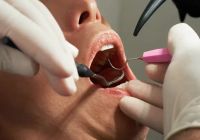Flossing is a fundamental aspect of maintaining good dental health and oral hygiene. It involves using a thin thread to remove food particles and plaque from between the teeth, which is difficult for toothbrushes to reach. However, many individuals find that flossing stinks, leading to curiosity about why it happens. There are several reasons why flossing may have an unpleasant odor, and in this article, we will explore the main causes and solutions to get rid of the stink.
Food Particles trapped between teeth
The most common reason for a bad odor during flossing is food particles that become trapped between the teeth. Food remnants from meals, particularly fatty or fibrous foods, can rot and emit a foul smell overnight. When these particles are not removed promptly, they can attract bacteria that break them down, leading to an unpleasant odor. By removing these particles regularly during your flossing routine, you can help prevent odors caused by food decay.
Bacterial activity and breath odor
Another factor contributing to the stench of flossing is the presence of anaerobic bacteria in the oral cavity. Anaerobic bacteria, which cannot survive in the presence of oxygen, generate volatile sulfur compounds (VSCs), the primary culprits behind body odor, garlic breath, and floss-related stench. When the floss comes into contact with these bacteria, it can pick up VSCs, leading to an unpleasant smell during and after flossing. Periodontal disease, which affects the gums and surrounding tissues, is often associated with poor oral hygiene, including bad breath.
Gum disease and oral hygiene
Poor flossing habits can contribute to gingivitis, a condition that affects the gums and can lead to periodontal disease. Gingivitis causes the gums to become red, swollen, and prone to bleeding, and it is also a common contributor to bad breath. Regular flossing can prevent the buildup of plaque and tartar by removing food particles and bacteria from the crevices, which can help reduce the risk of gum disease and associated breath odor.
Neglected oral hygiene
If you have not been practicing regular flossing, odds are that there is a buildup of plaque and bacteria between your teeth, which can lead to a more pronounced odor when you finally decide to floss. Not only can neglected oral hygiene result in a foul odor, but it can also lead to other health issues such as tooth decay and gum infection. By establishing a consistent flossing routine, you can help prevent these problems and maintain good oral health.
Preventing bad breath after flossing
To minimize or eliminate the smell during and after flossing, you can employ several strategies. Brushing your teeth twice a day with fluoride toothpaste, using an electric toothbrush, and maintaining a balanced diet rich in vitamins can help prevent bad breath. Rinsing your mouth with an antibacterial mouthwash before flossing can also reduce the number of bacteria in your mouth. Additionally, using a tongue scraper to remove bacteria and debris from the tongue and chewing sugarless gum can help stimulate saliva production, which in turn can help neutralize bad breath causing compounds.
Seeking professional help
If the odor persists despite your best efforts to prevent and manage it, it may be necessary to consult with a dentist. Your dentist can perform a thorough examination and identify any underlying dental issues that may be causing the bad breath. If needed, professional cleaning and periodontal therapy can help improve your oral hygiene and eliminate the unwanted stench. In the meantime, continuing to practice excellent oral hygiene by flossing daily, maintaining a balanced diet, and using antibacterial mouthwashes can help mitigate the symptoms and prevent future episodes of bad breath.
Understanding why flossing smells bad and taking proactive steps to prevent and manage this issue can help ensure fresh breath, a healthy set of teeth, and a confident smile.








